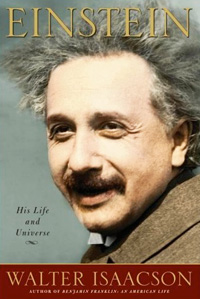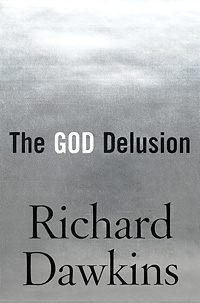I have given much thought to the creationists’ demand that evolution be stricken from public school science classes, or that it be taught side-by-side with creationism because “evolution is only a theory” and since “no one was there to witness the creation” we cannot say for sure what really happened. (continue reading…)
read or write comments (31)
A couple of times a year, in between his celebfest of stars, Larry King hosts the UFOlogists who regale the talk show king with an endless parade of blurry photographs, grainy videos, and breathless tales of government coverups and conspiracies. This night Larry included a couple of skeptics: Michael Shermer of Skeptic magazine and Buzz Aldrin, of Apollo 11 fame, who described his own UFO experience during his trip to the moon (it turned out to be one of the rocket panels carried out with them). (continue reading…)
read or write comments (84)
A review of Walter Isaacson’s Einstein: His Life and Universe.
In the final weeks of his life Albert Einstein learned of the death of his old physicist friend Michele Besso from his Zurich student days six decades before. “He has departed from this strange world a little ahead of me,” Einstein wrote to the Besso family. “That means nothing. For us believing physicists, the distinction between past, present and future is only a stubborn illusion.”
What did Einstein mean by “us believing physicists”? Did he mean belief in the models of theoretical physics that make no distinction between past, present, and future? Did he mean belief in some impersonal force that exists above such time constraints? Was he just being polite and consoling? Who knows? Such is the enigma of the most well-known scientist in history whose fame was such that nearly everything he wrote or said was scrutinized for its meaning and import; thus, it is easy to yank such quotes out of context and spin them in any direction one desires. Without a rich personal context in which to situate Einstein’s thoughts and theories it is hard to know for sure how to nuance his words. Until now. (continue reading…)
read or write comments (3)
Order from Skeptic.com
ORDER the debate on DVD
In this debate on what are arguably two of the most important questions in the culture wars today — Is Religion a Force for Good or Evil? and Can you be Good without God? — the conservative Christian author and cultural scholar Dinesh D’Souza and the libertarian skeptic writer and social scientist Michael Shermer, square off to resolve these and related issues, such as the relationship between science and religion and the nature and existence of God. This event was one of the liveliest ever hosted by the Skeptics Society at Caltech, mixing science, religion, politics, and culture.
Dinesh D’Souza is the Robert and Karen Rishwain Fellow at the Hoover Institution at Stanford University. Investor’s Business Daily called him one of the “ top young public-policy makers in the country,” and the New York Times magazine named him one of America’s most influential conservative thinkers. Before joining the Hoover Institution, Mr. D’Souza was the John M. Olin Fellow at the American Enterprise Institute. In 1987–88 he served as senior policy analyst at the Reagan White House. From 1985–1987 he was managing editor of Policy Review. He graduated Phi Beta Kappa from Dartmouth College in 1983. His books include the New York Times bestseller What’s So Great About America. His 1991 book Illiberal Education was the first study to publicize the phenomenon of political correctness. He is also the author of The Virtue of Prosperity: Finding Values in an Age of Techno Affluence. D’Souza’s articles have appeared in the New York Times, Wall Street Journal, The Atlantic Monthly, Vanity Fair, New Republic, and National Review. His latest book is titled What’s So Great About Christianity? (continue reading…)
read or write comments (79)
A review of Richard Dawkins’ The God Delusion (Bantam Books, 2006, ISBN 0618680004). This review was originally published in Science, January 26, 2007.
There is no position on which people are so immovable as their religious beliefs. There is no more powerful ally one can claim in a debate than Jesus Christ, or God, or Allah, or whatever one calls this supreme being. The religious factions that are growing throughout our land are not using their religious clout with wisdom. They are trying to force government leaders into following their position 100 percent. If you disagree with these religious groups on a particular moral issue, they complain, they threaten you with a loss of money or votes or both. I’m frankly sick and tired of the political preachers across this country telling me … that if I want to be a moral person, I must believe in A, B, C, and D. Just who do they think they are?
Such stirring words, spoken with such moral conviction, must surely come from an outraged liberal exasperated with the conservative climate of America today, and one can be forgiven for thinking that in a review of The God Delusion these are the words of Richard Dawkins himself, who is well known for not suffering religious fools gladly. But no. They were entered into the Congressional Record on 16 September 1981, by none other than Senator Barry Goldwater, the fountainhead of the modern conservative movement, the man whose failed 1964 run for the presidency was said to have been fulfilled in 1980 by Ronald Reagan, and the candidate whose campaign slogan was “In Your Heart You Know He’s Right.” (continue reading…)
read or write comments (2)



